Šentjanževka (Hypericum perforatum) je zdravilna rastlina, ki raste v mnogih predelih sveta. Ima številne zdravilne lastnosti, saj se pogosto uporablja za zdravljenje različnih bolezni, vključno z depresijo, fobijami, PMS, celo hemoroidi in različnimi kožnimi težavami.
Šentjanževka (Hypericum perforatum): Splošno | Koristi uporabe Šentjanževke | Depresija, stres in tesnoba | Menopavza | Priprava | Možni stranski učinki | Morebitna opozorila | Vprašanja in odgovori | Viri/reference
Šentjanževka, botanično znana kot Hypericum perforatum, je listnata rastlina, ki raste na odprtih, neurejenih območjih, večinoma na področjih Evrope, zahodne Azije in južne Afrike. Je rastlina z rumenimi cvetovi, ki so jo v tradicionalni evropski medicini uporabljali že stari Grki.
Ime šentjanževka se očitno nanaša na Janeza Krstnika, saj rastlina cveti okoli praznika sv. Janeza Krstnika konec junija. Cvetovi šentjanževke so široko uporabni - uporabljajo se za pripravo tekočih izvlečkov, tablet/kapsul in čajev.
Slika: Izgled Šentjanževke (lat. Hypericum perforatum).
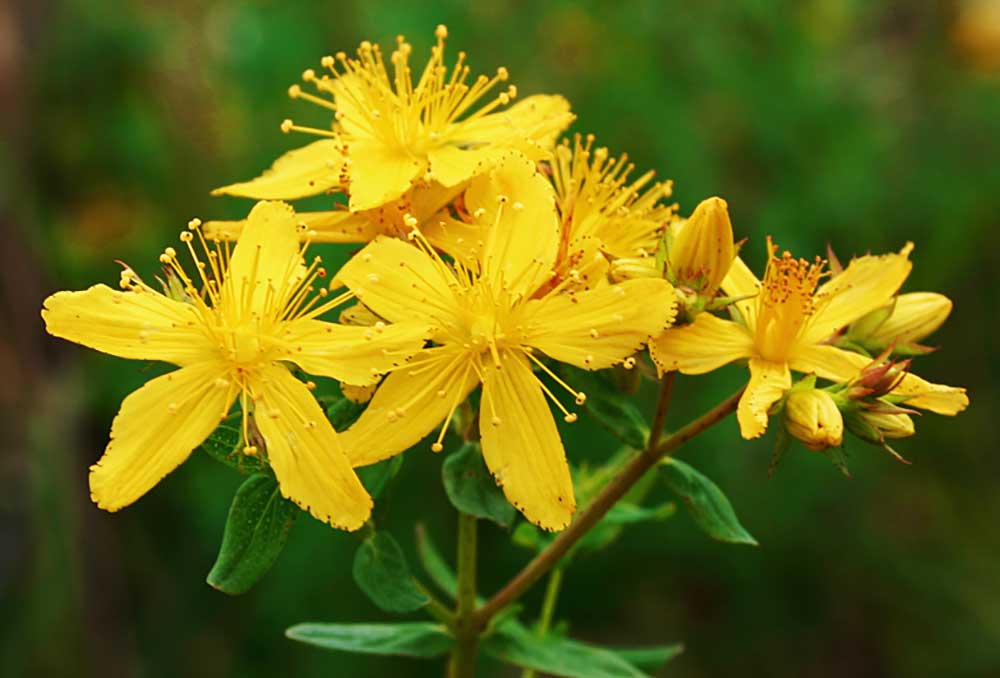
Šentjanževka je ena najbolj znanih zdravilnih rastlin v Sloveniji, katere lastnosti potrjujejo številne študije in raziskave. Rastlina je trajnica z vretenasto razraslo koreniko. Njeno pokončno dvorobo steblo lahko v višino zraste tudi do 70 cm in se na zgornji tretjini razveji. Listi rastline so ovalno jajčaste, eliptične oblike in so skoraj brez pecljev, nasprotno nameščeni in po površini nekoliko prosojno pikčasti.
Video vsebina: je uživanje šentjanževke varno? Ali je tudi efektivno pri lajšanju simptomov blažjih depresij

Cvetovi šentjanževke so zlato rumene barve ter zvezdaste oblike in sestavljajo gosta metličasta socvetja. Rastlina nosi pet zelenih čašnih listov in pet rumenih venčnih listov. Ko rumene cvetove zmaceriramo med prsti, se le ti rdeče obarvajo, kar kaže na to, da smo nabrali pravo rastlino.
Zaradi svoje priljubljenosti in dostopnosti je šentjanževka postala predmet številnih raziskav in kliničnih študij, ki potrjujejo njene koristi in opozarjajo na potencialne interakcije z drugimi zdravili. Njena dolga zgodovina uporabe in sodobne raziskave prispevajo k njenemu ugledu kot pomembnega sredstva v fitoterapiji.
Koristi uporabe Šentjanževke
Koristi uporabe šentjanževke so široke. Njena najprepoznavnejša lastnost je sposobnost izboljšanja razpoloženja, kar jo dela priljubljeno izbiro za tiste, ki iščejo naravne alternative antidepresivom. Razumevanje teh koristi je ključno za tiste, ki želijo izkoristiti potencial te rastline za izboljšanje svojega zdravja in dobrega počutja.
Proti depresiji, stresu in tesnobi
V zadnjih letih so šentjanževko obsežno preučevali kot zdravilo za depresijo in anksioznost (več v ugledni reviji: https://www.sciencedirect.com/topics/medicine-and-dentistry/hypericum-perforatum).
Večina študij namreč kaže, da lahko šentjanževka pomaga pri zdravljenju blage do zmerne depresije, zato njen ekstrakt farmacevtske firme pogosto vgrajujejo v zdravila rastlinskega izvora ter prehranska dopolnila in ima kot tak pogosto manj stranskih učinkov kot večina drugih sintetičnih antidepresivov, ki so predpisani na recept. Kot vsako zdravilo ima tudi zdravilo z ekstraktom šentjanževke stranke učinke kot tudi medsebojne interakcije, zato je pred uporabo tovrstnega zdravila/dopolnila smiselen posvet z izkušenim farmacevtom.
Video vsebina: prednosti šentjanževke.

Obstajajo torej prepričljivi dokazi, da lahko šentjanževka zmanjša simptome blage depresije - predvsem pri ljudeh z blago do zmerno obliko. V številnih študijah se zdi, da deluje tako dobro kot selektivni zaviralci ponovnega privzema serotonina (SSRI), pogosto predpisana vrsta antidepresivov, ki se predpisuje predvsem za zdravljenje zmernih do hujših tipov depresije. Poleg tega se zdi, da izdelki iz šentjanževke ne povzročajo izgube spolne sle, ki je še eden najpogostejših stranskih učinkov sinteznih antidepresivov.
Opravljenih je bilo veliko kliničnih študij (https://pubmed.ncbi.nlm.nih.gov/12153829/) primerjave učinkovitosti šentjanževke s placebom in antidepresivi. Večinoma so ugotovitve takšne, da je zeliščno zdravilo z vsebnostjo šentjanževke učinkovitejše od placeba in po svoji učinkovitosti pogosto enakovredno standardnim antidepresivom za zdravljenje blage do zmerne depresije.
Veliko raziskav v zvezi s šentjanževko se nanaša na njeno uporabo pri zdravljenju depresije, ob enem pa ne smemo prezreti dejstva, da sta depresija in anksioznost tesno povezani. Po podatkih zaupanja vrednega vira (https://adaa.org/ understanding-anxiety/facts-statistics) približno 50 % ljudi z depresijo trpi tudi za obliko anksiozne motnje.
Če se soočate z občutki tesnobe in anksioznosti, bi vam lahko jemanje šentjanževke koristilo, saj ta blagodejno vpliva na psihološko stanje, razpoloženje ter čustveno ravnovesje.
Zmanjša simptome menopavze
Nekateri dokazi namigujejo, da lahko jemanje šentjanževke same ali pa v kombinaciji z zeliščem Cimicifuga Racemosa zmanjša simptome menopavze, kot so denimo vročinski oblivi.
Slika: Izgled Cimicifuga Racemose.
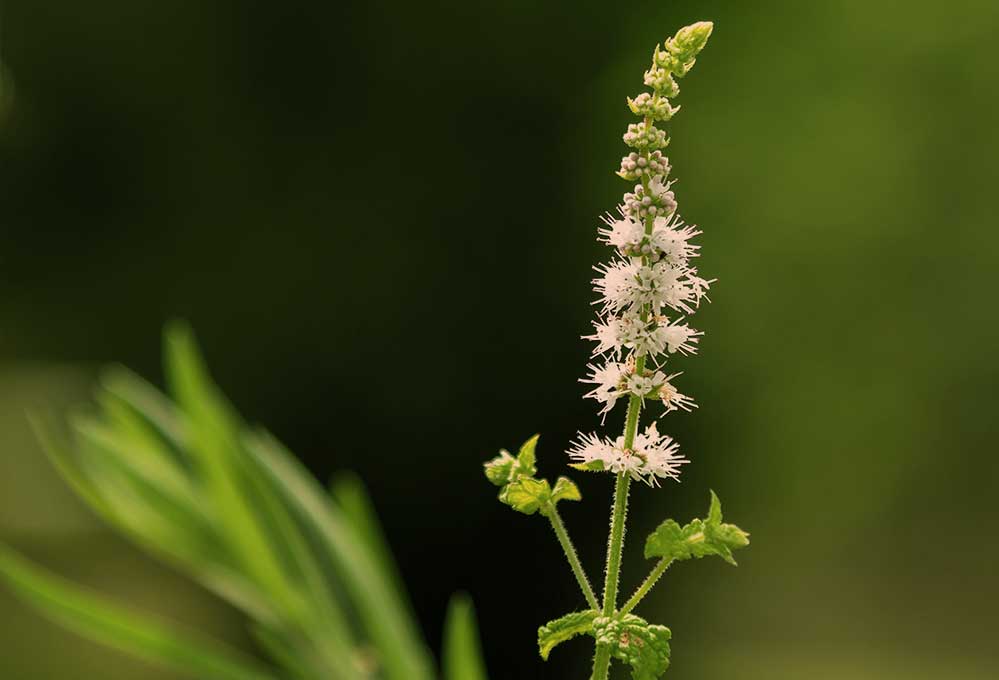
Kombinacija Cimicifuga Racemose in Šentjanževke ima zanimive učinke na organizem.
Priprava šentjanževke
Šentjanževko najpogosteje uživamo v obliki kapljici ali kapsul, skladno z navodili za uporabo. Posušeno zelišče se lahko uporablja tudi kot čaj. Tradicionalno se čaj uporablja kot tonik živčnega sistema za lajšanje tesnobe, slabega razpoloženja in nevralgije.
Če ste noseči, dojite ali jemljete druga zdravila, se pred uporabo pripravka z šentjanževko posvetujte s svojim osebnim zdravnikom.
Šentjanževka zaradi svoje učinkovitosti pogosto vpliva na druga zdravila (stranski učinki), zato je pomembno, da si natančno preberete navodila za uporabo zdravilnega čaja.
Možni stranski učinki
Zeliščno zdravilo oziroma izvleček, pridobljen iz rastline Hypericum perforatum je pripravek, ki je izredno koristen pri depresiji in anksioznosti.
Jemanje zgolj šentjanževke pogosto ni problematično v povezavi z zdravjem vaših jeter, ob jemanju v kombinaciji z drugimi zdravili pa lahko signifikantno poveča hepatotoksičnost drugih zdravilnih učinkovin, saj šentjanževka učinkuje na sistem citokroma P450 (indukcija CYP 3A4 in 2C9) ter glavnih transportnih proteinov zdravila.
Šentjanževka in njeno jemanje ima lahko številne stranske učinke, saj interagira z zaviralci koagulacije, antikoagulanti in nekaterimi psihotropnimi učinkovinami. Pri uporabi šentjanževke je vsekakor je potrebna velika mera previdnosti in preverjanje specifičnih interakcij.
Video vsebina: kakšni so stranski učinki jemanje šentjanževke?

Jasno je bilo dokazano, da je lahko uporaba šentjanževke nevarna, včasih celo smrtno nevarna, še posebej v primerih interakcij z drugimi zdravili. Če ste negotovi se glede jemanja obrnite za zdravnika ali farmacevta.
Morebitna opozorila in navodila pred pričetkom uporabe šentjanževke
Šentjanževka se na splošno šteje za varno, če jo jemljete peroralno do 12 tednov v ustreznih predpisanih odmerkih, brez sočasnega jemanja drugih zdravil. Čeprav se zelišče v ustreznih odmerkih običajno dobro prenaša, pa lahko povzroči stranske učinke.
Neželeni učinki šentjanževke vključujejo fotosenzitivnost (fototoksična reakcija), gastrointestinalne težave, alergijske reakcije, utrujenost ali nemir. Nekateri ljudje lahko občutijo tudi glavobole. Pripravke Hypericum perforatum je potrebno jemati previdno, saj je znanih veliko interakcij z zdravilnimi učinkovinami - le-te so navedene spodaj.
Pogoste interakcije v povezavi s šentjanževko
- Kontracepcijske tablete
- Nekatera peroralna zdravila za redčenje krvi, vključno z varfarinom in fenprokumonom
- Nekatera zdravila, ki zavirajo reakcije zavrnitve presadka, vključno s ciklosporini
- Nekatera zdravila za srce, vključno z digoksinom in ivabradinom
- Nekatera zdravila za HIV, vključno z indinavirjem in nevirapinom
- Nekatera zdravila proti raku, vključno z irinotekanom in imatinibom
- Verapamil
- Nekateri statini, vključno s simvastatinom
- Različna zdravila za depresijo, vključno z amitriptilinom, nortriptilinom, midazolamom
- Teofilin
Pripravki iz šentjanževke pogosto povečajo tveganje za nastajanjem sončnih opeklin zaradi njenih fototoksičnih lastnosti, kar lahko naredi kožo bolj občutljivo na sonce, zlasti pri svetlopoltih ljudeh, zato je na mestu intenzivna zaščita kože z visokim faktorjem zaščite. Tovrstni stranski učinki so še pogostejši pri dermalni uporabi šentjanževke - v ta namen se je smiselno izogibati solarijem in pretiranemu sončenju.
Obvestite svojega zdravnika, če želite jemati šentjanževko, kar je še posebej pomembno v primeru, če jemljete tudi kakršno koli drugo zdravilo. Pogovor z zdravnikom in izbor ustreznega pripravka je pogosto najboljši ter najbolj varen način za podporo svojemu razpoloženju in dobremu počutju.
Vprašanja in odgovori
Za kaj vse je šentjanževka uporabna?
Šentjanževka je učinkovita predvsem pri depresiji, simptomih menopavze, motnji pozornosti in hiperaktivnosti (ADHD).
Je šentjanževka učinkovitejša od antidepresivov?
Šentjanževka lahko pomaga pri zdravljenju blage do zmerne depresije, učinki pa se zdijo podobni učinkom antidepresivov namenjenih zdravljenju blagih do zmernih depresij.
Video vsebina: depresija in jemanje šentjanževke.

Znano je tudi, da ekstrakt šentjanževke ni učinkovit pri zdravljenju hujših oblik depresij.
Kako strupeno je lahko jemanje šentjanževke?
V dovolj velikih količinah je šentjanževka lahko zelo strupena za človeka. Glavna nevarnost je sestavina hipericin, ki povzroča fotosenzitivnost kože, kar povzroči hud izpuščaj in v najhujših primerih celo odmrtje kože (nekroza). Poznani so tudi drugi potencialno toksični učinki, predvsem na račun interakcij šentjanževke z drugimi zdravilnimi učinkovinami.

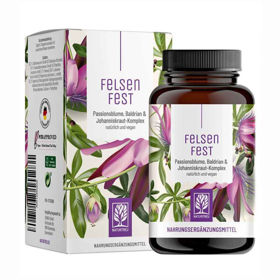
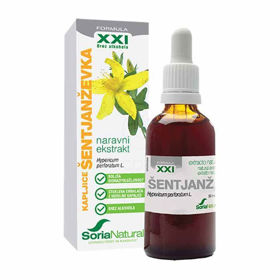
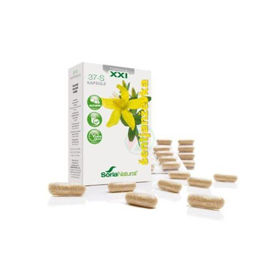
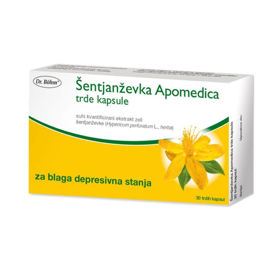



 Facebook
Facebook
 Instagram
Instagram
 info@moja-lekarna.com
info@moja-lekarna.com

